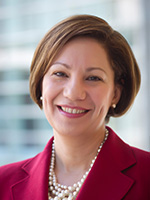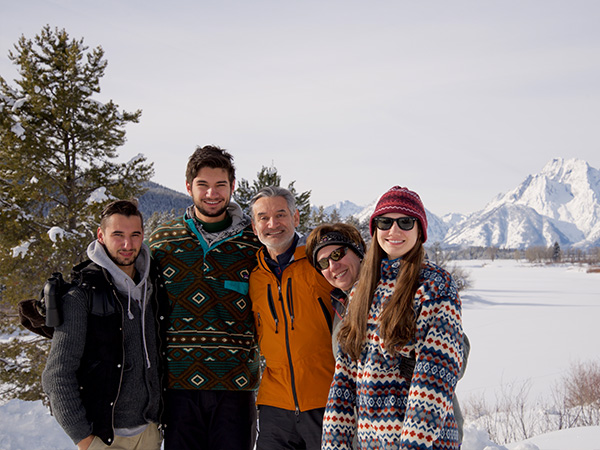August 2017

Patricia Rivera, MD
Patricia Rivera, MD, began her college career as a communication arts major. Before Oprah Winfrey was a celebrity, she dreamed of being a broadcast journalist, conducting interviews, and sharing compelling human interest stories.
She drew inspiration from her grandmother, who in Cuba, graduated as one of the first female pharmacists in her time. Several children in the family followed in their grandmother’s footsteps, pursuing careers in science, technology, engineering, and mathematics. It wasn’t until an anatomy and physiology class that Dr. Rivera realized that she, too, was drawn to STEM. She then immediately changed her major to medicine.
Now part educator and part clinical researcher, she is a professor of medicine in the Pulmonary/Critical Care Division of the University of North Carolina at Chapel Hill. In addition, she serves as the director of the university’s Lung Cancer Screening Clinic and Pulmonary Function and Bronchoscopy Laboratory, and co-director of the Multidisciplinary Thoracic Oncology Program.
Lynn Tanoue, MD, a professor at Yale University School of Medicine, regards Dr. Rivera as a “cornerstone” of the thoracic oncology group at UNC. “Patricia has been involved in projects relating to processes of care, including screening, risk assessment, lung nodule evaluation, and multidisciplinary management at her own institution, as well as at the national level.”
Teaching future leaders of the pulmonary medicine profession has been Dr. Rivera’s passion. She works hard to be a good role model, like her first mentor and role model, the late Dorothy White, MD, from Dr. Rivera’s training days at Memorial Sloan-Kettering Cancer Center. Today, Dr. Rivera helps trainees develop expertise in asking questions and generating new ideas. “Patient care demands this of us,” she says, “Curiosity and innovation are key.”
Lydia H. Chang, MD, is an assistant professor of medicine at UNC. “Those of us privileged to work with Dr. Rivera are better doctors because of her example,” she says, “which harkens back to the days when medicine was a calling and not just a job.”
Thoracic oncology has evolved rapidly in Dr. Rivera’s two decades of practicing medicine. “Knowledge has exploded,” she says. “Two decades ago most people did not survive lung cancer diagnosis.” Because of advances in science, health care has transformed from something dismal to something hopeful, with data at every stage of disease. Dr. Rivera adds, “Cancer survivors are now living longer and receiving more support to increase their quality of life.”
Frank Detterbeck, MD, FCCP, professor of surgery and chief of Thoracic Surgery at Yale University, has been a colleague for over 20 years, including 10 years that he worked rounds alongside Dr. Rivera. “Patricia is one of the leading pulmonologists in the field. She is equally impressive in the way she delivers clinical care as she is in the way she promotes the advancement of clinical science and evidence-based medicine.”
Dr. Rivera considers the lung a “beautiful organ” and is still fascinated by it. She is excited at the interconnections between the lung and every other organ. Respiratory medicine encompasses a broad spectrum. “We see everything,” she says. Her collaborative practice includes an understanding of neurology, gastroenterology, rheumatology, infectious disease, among many other specialties and conditions.
As she continues to guide the next generation of fellows at UNC and lead lung cancer screening efforts in her state, Dr. Rivera will also strive to address social aspects of care and health inequality. “As a minority physician, I’m keenly interested in addressing health disparities. And I am proud to belong to a profession dedicated to the service of others.”
Since she was a fellow, she was in awe of presenters at the ATS’s Annual International Conference, and individuals tirelessly devoting their lives to research. She has now become one, with countless contributions to the Society and the Assembly on Thoracic Oncology, what she considers “the voice for lung cancer at the ATS.”
With Societal support, she co-chaired a workshop on lung cancer screening in patients with co-morbidities. Its aim was to identify gaps in knowledge and propose research priorities to address how co-morbid conditions should be incorporated into decision-making about screening eligibility. She has also benefited greatly from peer-to-peer learning and networking opportunities through the ATS.
In her free time, Dr. Rivera enjoys dance and runs a book club with other female professionals at UNC. She travels extensively with her family. Their goal is to visit every national park.

Dr. Rivera, her husband, and three children, on one of their outdoor adventures.

